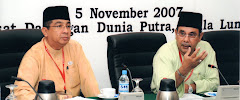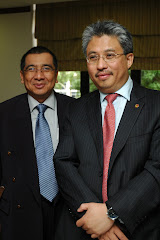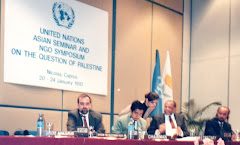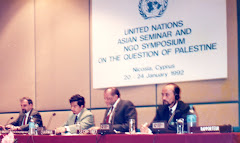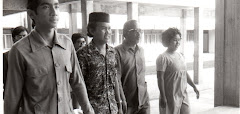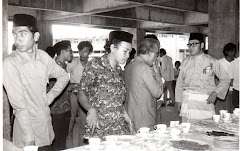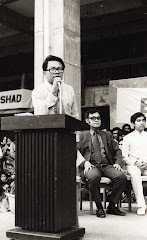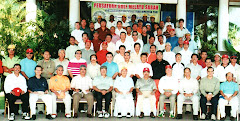A heads up. It is probably unfair to expect Umno voters to all be as "individual" as the unaffiliated segments of the general election electorate.
Party affiliation, things they do together for decades such as battling it out in nationwide polls and by-elections, also loyalty to opinion leaders and establishment personalities, would inevitably produce discernible even predictable voting patterns.
Party insiders tend to thread cautiously in dealing with some of the hard facts and likely outcomes, perhaps fearing Umno watchers may draw too rapid a conclusion, especially detrimental ones.
They have, in conversations this past week, hinted at quantities of bloc voting, repeating the trend seen at last Saturday's polls for Wanita, Youth and Puteri.
"The majority of the voters are from my generation," said Datuk Naim Mohamad (born in 1954) who started his political education as a special officer to the then youngish Malacca chief minister Tan Sri Rahim Thamby Chik. Datuk Seri Mohd Ali Rustam, one of the six vice-presidential contenders, was a fellow special officer.
"The mindset of my generation is to back the establishment," said Naim.
The backdrop. The excitement induced by the presence of a son of the much loved Tun Dr Mahathir Mohamad in the form of the well, loveable, Datuk Mukhriz Mahathir has helped galvanise an election that is threatening to match the energy and enthusiasm thrown up by the May 5 nationwide polls.
There is this charm about Mukhriz, a quality honed by pedigree and polish, translating into admirations by those outside Umno, too.
A promising result for the Kedah menteri besar shall be viewed as a plus for a party deemed by a segment of Malays as having grown apart from their consciousness.
A formidable obstacle for Mukhriz, according to an insider, is the influence wielded by the ketua bahagian (divisional leaders) nationwide.
"There is a certain hierarchy about the voting patterns ... a majority of leaders at the branches will take the cue from the divisional leaders," said the insider.
Then, again, some of the divisional leaders are facing a challenge.
"There will be a split, but we don't expect too many upsets."
As this narrative does desperately need fresh injection of excitement, this reporter was speaking to a newly elected member of Umno Youth, Tengku Zuhri Aziz, 36, the other day.
He has the added perspective of operating from the Lembah Pantai division in Kuala Lumpur.
The New Straits Times has also benefited from lengthy conversations with all six contenders over the past few weeks.
No, mediocrity is not prevalent in the party.
These personalities are thoroughbreds. They have been around and worked hard.
"Ali Rustam never sleeps," said Naim, mindful of the exaggeration.
Datuk Seri Mohd Shafie Apdal is articulate, perhaps surprisingly so as statements issued to the press do not really bring out the depth of a person.
Shafie was most poignant, recounting the episode of the Datuk Seri Anwar Ibrahim versus Tun Ghafar Baba episode in 1993.
"I had later gone to see Tun Ghafar to apologise to him," said Shafie, who found the late Ghafar, who was most instrumental in bringing Umno to Sabah, magnanimous and forgiving. Anwar won the contest.
"These guys who are contesting... they are serious contenders, towering personalities with a track record," said a political analyst.
Datuk Seri Dr Ahmad Zahid Hamidi exudes this infectious sort of energy, smiles unfailingly and even gives the impression he has done a fair bit of research into your writing style.
The NST wanted most to discern what moves a young Umno voter like Zuhri. He must surely see Zahid, Datuk Seri Hishammuddin Hussein, who is credited in party circles as having trained many of the party's young leaders when he was Umno Youth leader, and Mukhriz as second echelon leaders.
So, will that rule out, say, Ali Rustam?
"Some voters want a VP to take care of the needs of party members, and focus on the party, so he can't be discounted," said Zuhri.
This reporter, was in turn, asked last night why Tan Sri Mohd Isa Abdul Samad is in the fray.
Isa has his legions of supporters and was actually voted into the VP line up in 2004 before he was suspended.
The NST asked him the same question.
"I represent members of my generation. I am a party senior," said the 63-year-old former menteri besar of Negri Sembilan.
Zuhri said outsiders must not be ruled out.
"You will see true democracy in the contest for the top posts. Every vote has a different consideration."
Naim, on his part, acknowledged that the younger set of voters shall be freer in expressing their wishes today.
Familiarity, reservoirs of goodwill, a ministerial portfolio, seniority and networks shall shape the outcome, given that contenders cannot be talking to every single voter.
There is something else, even a more definitive conclusion. Umno members say they shall assemble a team that shall engage Pakatan in the 14th General Election or PRU 14. Malaysians will encounter this new acronym -- PRU14 -- a fair bit from now on.
A supreme council member was at press time summing up the impact of the VP contest.
"Even if Mukhriz finishes a strong fourth, he shall be, at 49, ahead of the curve.
"Remember, Tun Abdullah Ahmad Badawi was not in the VP line up in 1993, and three years later, Tan Sri Muhyiddin Yassin was unsuccessful in his bid to retain his VP seat.
Both eventually came back and moved up the ranks."
Read more: Discerning winners and trends - Columnist - New Straits Times http://www.nst.com.my/opinion/columnist/discerning-winners-and-trends-1.379388#ixzz2i7rpHbw2






























